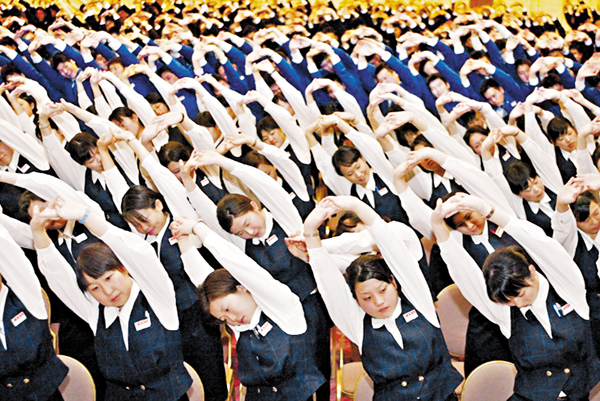 ■日本政府將推出新制度,縮短外國高級人才取得永久居留權的時間。圖為日企員工做早操。 資料圖片
■日本政府將推出新制度,縮短外國高級人才取得永久居留權的時間。圖為日企員工做早操。 資料圖片【原文】下文摘錄自香港《文匯報》11月18日報道:
《日本經濟新聞》(The Nihon Keizai Shinbun)早前報道,日本政府將推出新制度,縮短擁有專業知識的外國高級人才(professional/ talent/specialist/expert)取得永久居留權(permanent residency)的時間,成為全球最低門檻(threshold)的永久居留資格申請制度,以吸納外國人在研究開發等方面的高級技術。
按學歷等打分 最快一年速入籍
香港某人力資源(human resources)顧問公司形容,日本放寬專才居留權是「專揀靚仔」(優秀人才),用永久居留引誘(lure)他們留下。日本放寬居留權後,外國專才更容易在當地穩定下來,企業也更傾向考慮聘任,有助專才求職(job hunting)。
日本在今年6月公佈的增長戰略(strategy)中,明確寫入「創設世界上最快級別的日本版外國高級人才綠卡(green card)制度」。放寬對象為擁有「高度專門職」居留資格的高級人才。按照「高級人才積分制(points-based system)」,根據博士學位等學歷、實際任職年數、年收入打分,超過70分就能獲居留資格。
這是去年4月出台的居留資格,截至去年底共有1,508人獲取,其中中國人佔64%。
擁有這一資格的外國人目前需逗留5年才能申請永久居留權,新制度首先把逗留期限改為3年,當中又被認定具高水平經營能力的外國人,逗留1年後申請也能獲批。若取得永久居留權,除了可在日本自由選擇職業外,還能申請房貸(home loan)。
外國人學校醫院仍不足
不過,在日華人行政書士富永悠人形容「這僅是個夢想」,他指出,1年可申請永久居留的政策目前只是提案,即使實施,很可能只是不用更新簽證的「永久居住權」,而非永久居留簽證(permanent residence permit)。
高級人才要定居日本,語言是一大障礙(language barrier),輿論普遍認為,政府應在稅收方面,扶持接收外國企業家和技術人員子女的國際學校,改善教育環境。工作方式改革也具有重要意義,與日本相比,歐美更重視工作與生活平衡(work-life balance)。如果日本無法改變工時過長、女性就業困難等問題,外國人還是會對日本敬而遠之。
其他方面,醫院和銀行也要加強支援說英語的居民,日本政府承認醫療體制(health care system)存在問題,計劃到2020年在全國建立100間可接待外國人的醫院。
新居留權制度折射日本人口老化(ageing population)和勞動力不足(shrinking workforce)的問題,需要人口延續性來維持生產力(productivity)。 香港地少人多、居住等各方面配套未足以應付大量專才湧入(influx),因此仿效「住一年可獲永久居留」的招攬人才方式不太可行。
Japan downs "green cards" threshold to attract labor
【譯文】The Nihon Keizai Shinbun reported previously that the Japanese government would roll out a new policy that shortens the time for highly-skilled foreign professionals to gain permanent residency in the country. The proposed system of granting permanent-resident status, a system with the lowest threshold in the world, aims to make the country more attractive to global talents with expertise in cutting-edge technology.
Requisite stay period almost halved
A human resources consulting firm in Hong Kong commented that Japan's movement aimed to lure more talented foreigners to stay in the country. Foreign professionals would have a more stable life by obtaining permanent residency; hence the local enterprises may consider recruiting them and this would help facilitate their job hunting.
The Japanese government rolled out an economic growth strategy in June that calls for establishing one of the speediest systems to issue "green cards" to top-level personnel, cheifly targeting highly-skilled foreign specialists.
A points-based system has been used to evaluate foreigners based on the criteria of academic background, work experience and annual income; those with 70 points or above are eligible to stay in Japan. This yardstick has been in place since April 2015, with 1,508 foreigners being recognized as highly-skilled at the end of 2015, in which Chinese nationals made up 64 per cent of the group.
Currently, highly-skilled foreign professionals are required to stay in Japan for five consecutive years to qualify for permanent residency. Under the new system, the time frame will be shortened to three years, while talents who possess top management or technical skills can even have their requisite period reduced to one year. By becoming permanent residents, these people will get wider employment options and even qualify for home loans.
More hardware needed
However, critics have commented that it is "but a dream" to acquire permanent residency in one year, because it is highly likely the proposed policy would only allow living in Japan without visa renewal, not a "permanent residence permit" as widely expected.
Language barrier remains an obstacle hindering talents from moving to Japan. Many are urging the government to provide tax-based support for international schools that admit children of foreign professionals. Labor reform is also deemed necessary because the Western nations put more emphasis on work-life balance, meaning that foreign talents may take a step backward if Japan fails to tackle the issues such as long working hours and fewer females in the workforce. Besides, hospitals and banks are expected to offer more support to English-speaking clients, and the Japanese government has admitted that the health care system is somehow problematic and has planned to increase the number of foreigner-friendly medical centers to 100 by 2020.
The new policy is a reflection of the challenges of ageing population and shrinking workforce within Japan. The country needs to inject fresh blood to boost productivity.
In the case of Hong Kong, given the scarcity of land and resources, and the inadequacy of supportive measures such as housing to cope with an influx of a huge amount of foreign professionals, it is not feasible to recruit global talents by granting permanent residency simply with a one-year waiting period.■龐嘉儀
Questions
1. 很多國家的永久居民身份證(permanent resident card)都有別稱,日本的稱為什麼?
2. 承上題,美國的稱為什麼?
3. 加拿大的又稱為什麼?
4. 永久居民普遍擁有什麼權利?
5. 部分國家會要求永久居民履行什麼義務?
Answer
1. 櫻花卡
2. 綠卡(green card)
3. 楓葉卡
4. 投票權(suffrage)、出任公務員等
5. 服兵役(如新加坡)

